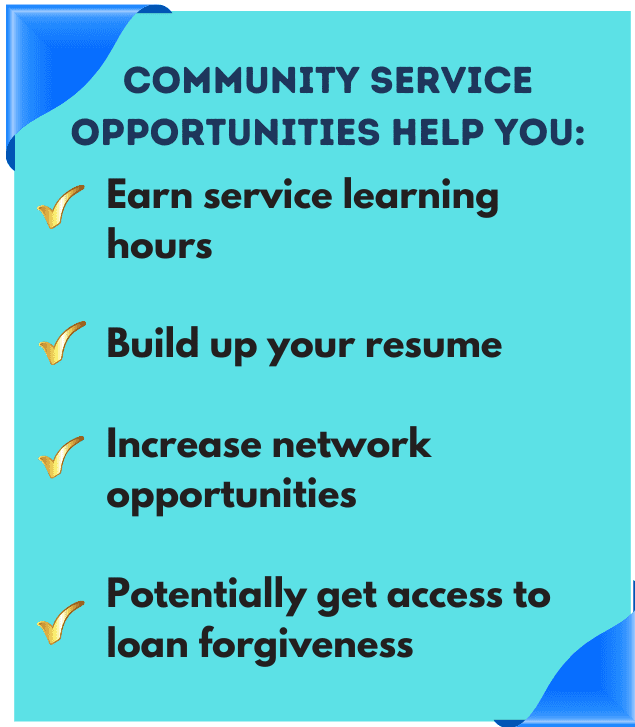
Community service does not only give you the chance to strengthen your community but also allows you to help change the world for the better. But if you come to think of it, the benefits of community service are also inward. These opportunities help you grow, and if you do it because you simply enjoy helping others, then you harness the most benefits.
Check out these helpful links: Guide to Student Loan Forgiveness, Virtual Social Clubs for Online Students in 2020, and 50 Essential Books for College Students in 2020!!!
In this article, you will find community service opportunities that will help you fulfill a certain amount of service hours, build up your resume, increase network opportunities, and potentially get access to loan forgiveness.

American Red Cross
American Museum of Natural History
National Audubon Society
Natural Resources Conservation Service – Earth Team Volunteers
Feeding America
Federal Election Volunteers – Become a Poll Worker.
VA Voluntary Service
Points of Light (Hands on Network)
The Nature Conservancy
Habitat for Humanity
American Red Cross
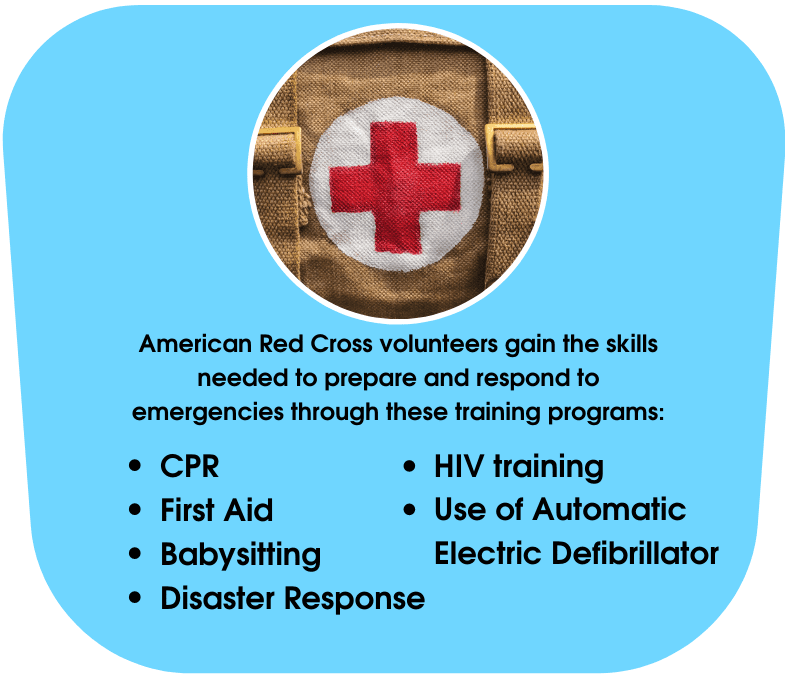
The American Red Cross is one of the largest and oldest organizations that provide humanitarian aid to soldiers and victims of war, supplies blood in the nation, delivers disaster relief and community outreach through services and gifts that include food, shelter, clothing, and medical supplies. If providing genuine assistance to others is up your alley, this organization might just be for you. It teaches its volunteers best practices to help victims prepare and respond to emergencies. They offer classes such as CPR, first aid, babysitting, disaster response training, HIV and automatic electric defibrillator training.
Several colleges and universities have partnered with the American Red Cross for academic service-learning. College students who are enrolled in programs like nursing, public health, and other disciplines earn college credits through their service-learning opportunities.

American Museum of Natural History
The American Museum of Natural History is known to be one of the largest museums in the nation and the world. Located in Manhattan in New York City, this historic structure was built over 140 years ago as a research and exhibit center on natural resources. Visitors from around the globe explore and experience lifelike exhibits from dinosaurs to human cultures and outer space. There are about 1,000 people who sign up as volunteers for AMNH each year. Volunteers perform duties like tour guides, teaching guides, staff information desks, and more.
College students can make the most out of their community service by helping the museum achieve its goals. Internship programs are available for all high school, college, and even graduate students. College students get this opportunity through AMNH’s Museum Education and Employment Program (MEEP) and Public Programs / Margaret Mead Film Festival Internship.

National Audubon Society
The National Audubon Society is an organization involved in nature conservation. It was established by George Bird Grinnell, an American anthropologist, historian, naturalist, and writer. He named the organization after John James Audubon, an ornithologist and naturalist. Grinnell created the organization after he was moved and repulsed by the mass slaughter of birds he witnessed. National Audubon Society aims to protect birds and other wildlife through scientific research, educational programs, and encouraging the government to make laws that protect the ecosystem. This is perfect for college students who plan to take on green careers. These students can find Audubon chapters across the nation and may sign up for community service.
The group has a diverse and flexible set of volunteer programs ready for different individuals. Its Audubon Center for Birds of Prey helps college students train and work for specific positions for service-learning hours.

Natural Resources Conservation Service – Earth Team Volunteers
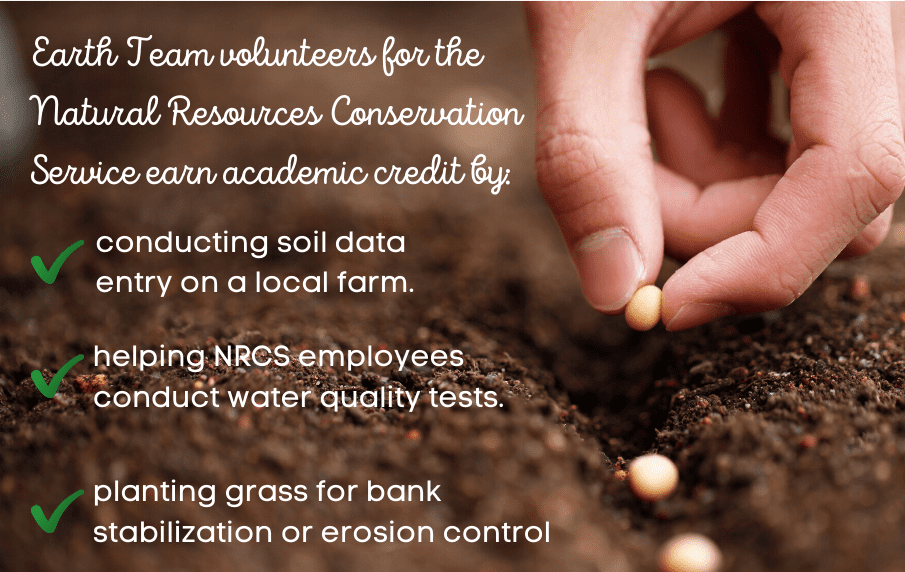
The Natural Resources Conservation Service is an agency of the United States Department of Agriculture dedicated to helping farmers and private landowners. The Earth Team program was founded in 1985 to work on the conservation of the nation’s natural resources and as NCRS’s volunteer workforce. Its volunteers are teamed up with NRCS employees and staff in dedicating their time to help farmers produce water resources, improve soil quality, protect watersheds, and enhance wildlife habitat. The program offers volunteer opportunities to individuals ages 14 and above.
College students from all over the country who are interested in volunteering for Earth Team can start by sending an email to its state volunteer coordinator. They can work part, or full-time, evenings, weekends in an NRCS office or even outdoors. Students can earn academic credit through volunteering for soil data entry on a local farm, plant grass for bank stabilization or erosion control, and help NRCS employees conduct water quality tests.

Feeding America
Feeding America is a non-profit organization established by an entrepreneur noted as the “Father of Food Banks,” John van Hengel. The organization started in the late 1960s when van Hengel ended up having more donations than the local soup kitchen he had volunteered in. Today, the organization has grown to over 200-member food banks that aim to fight hunger in the United States. They have been providing food to more than 46 million people across the nation.
College students who want to get involved can serve their community or serve internships at any Feeding America national office or network food bank. They can work in research, graphic design, or volunteer at the nearest food bank and food pantries. At the present, about 51% of the Feeding America programs are entrusted to its volunteers.

Federal Election Volunteers – Become a Poll Worker.
College students with an affinity to politics can volunteer as poll workers or assistants. Each state and local government organizes an election commission that encourages all individuals not just to participate through voting but also to become a poll worker. Poll workers conduct duties such as issuing ballots to voters, monitoring voting equipment, assisting voters, and explaining voting procedures and assisting the setup of the polling place.
Requirements are stated on the FEC website for students to comply with. Applicants have to pass a test or an assessment to show their competency in a particular job function. Poll workers’ positions include inspector, clerk, assistant clerk, deputy, or equipment operator. Some state and local governments provide a certificate to fulfill community service orders or school requirements.

VA Voluntary Service
College students who would like to make a difference in the lives of our veteran military members may get involved by doing voluntary work related to the needs of veterans and their families. A variety of VA operations need the help of volunteers. In most cases, student volunteers are assigned to VA’s medical centers. Besides training and experience, students can benefit from volunteering with the James H. Parke Memorial Youth Scholarship Award scholarship.
There are many services and specialties for student volunteers such as Audiology and Speech Pathology, Occupational Therapy, Physical Therapy, Nursing Patient Escort, Research, Laboratory Medicine, Outpatient/Ambulatory Care Activities, Information Technology, Medical Illustration, Social Work, Extended Care, and Medical Administration.

Points of Light (Hands on Network)
Points of Light was created as a result of a merger of two independent non-profit organizations, Hands on Network and Points of Light Foundation. HandsOn Network is based in Atlanta, Georgia, that hosts almost 50,000 projects a year. The organization helps rebuild communities, teach reading, build wheelchair ramps, and more projects that help strengthen communities. It collaborated with several companies to encourage volunteerism. Students may explore the volunteer services they offer on their website and sign up for a project. There are a multitude of volunteer positions and projects from animal welfare to immigration and refugee services.

The Nature Conservancy
The Nature Conservancy is an environmental organization established in 1951. It was founded to promote research and had developed to advocate for conservation. Its headquarters is located in Arlington, Virginia, and has more than 1 million members across the globe. College students may volunteer and immerse themselves in hands-on and educational experiences in the protection of the community’s species and natural habitats.
Depending on the state and location, volunteer programs strive to connect students with nature. College students can volunteer as plant stewards, translators, conservation ambassadors, videographers, and photographers. Several colleges and universities partner with the organization to coordinate research that supports sustainability and biodiversity.

Habitat for Humanity
Habitat for Humanity was established in 1976. It is a non-profit organization with the objective of building affordable, safe, and decent housing for residents in low-income areas. It was founded by Linda and Millard Fuller, who gathered families, volunteers, and resources to work together and create the homeownership process. Homeowners pay the costs to build their houses without interest. Its headquarters for international operations are located in Americus, Georgia, while its administrative office is in Atlanta.
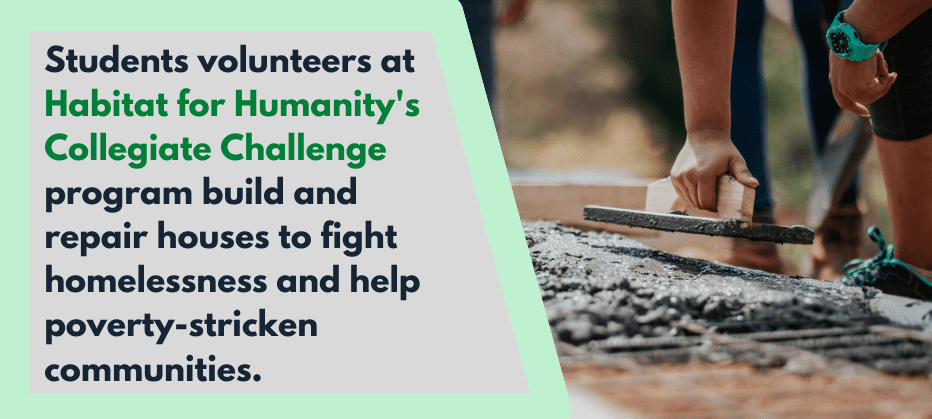
Local and community-level offices are established all over the country. With almost 500 Habitat campus chapters, the organization helps high school and college students make good use of their time and talent by offering community service opportunities. Campus chapters functions include direct service, fundraising, advocating, and educating. Students are encouraged to apply their academic skills in helping solve issues related to poverty housing and homelessness. It also offers school break programs like the Collegiate Challenge that allows students to build and repair houses.
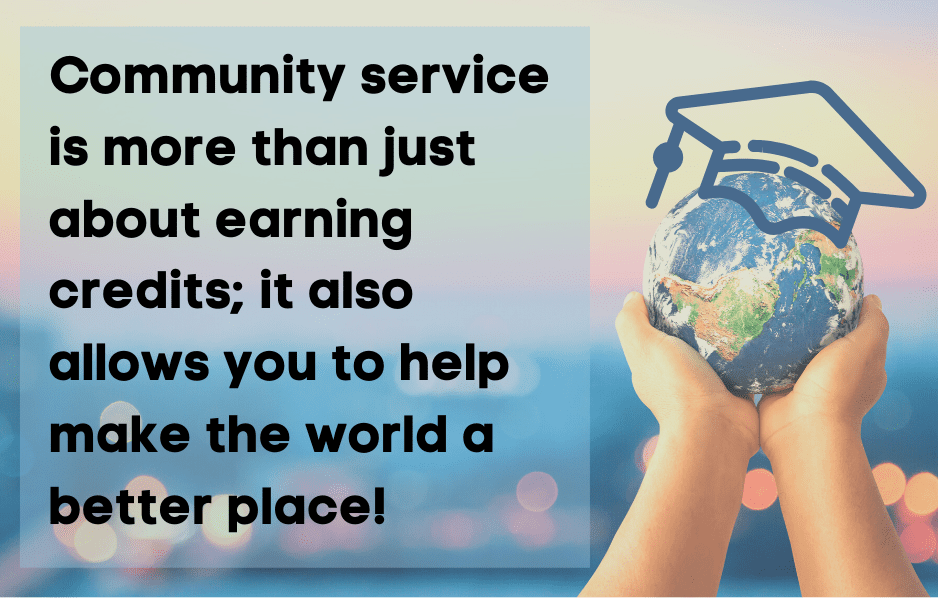
ADDITIONAL INFORMATION:
30 Best Online Degrees for Veterans 2020
24 Friendliest Colleges for the LGBTQ Community for 2020
10 Tips For Finding a College that Fosters Free Speech